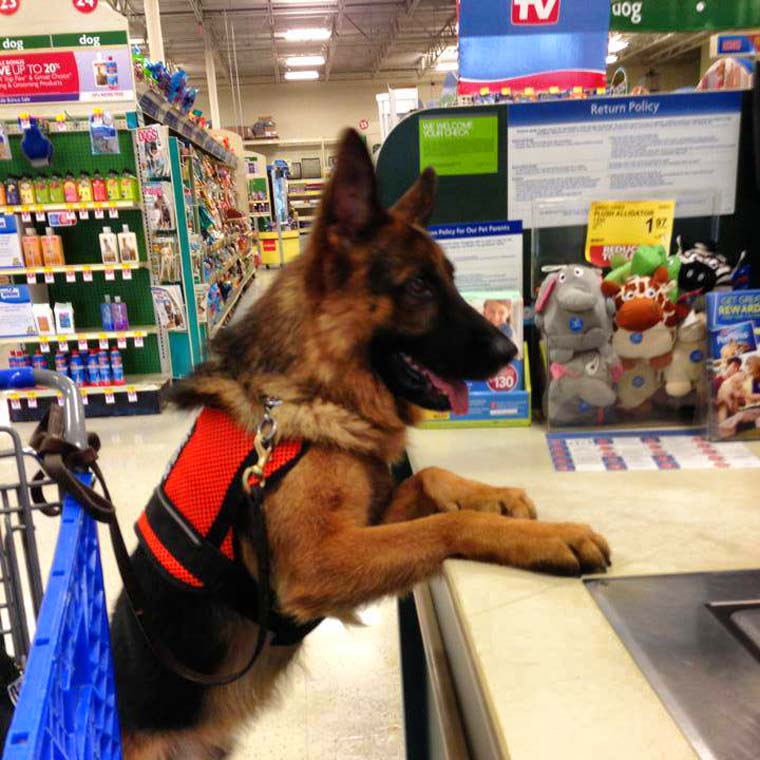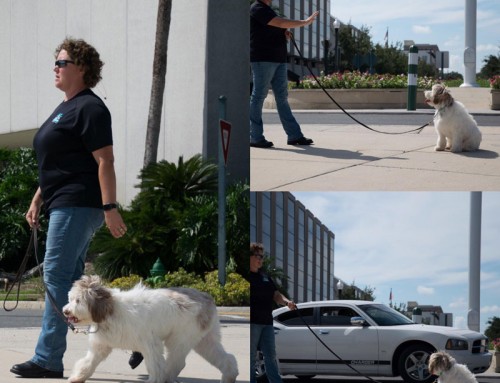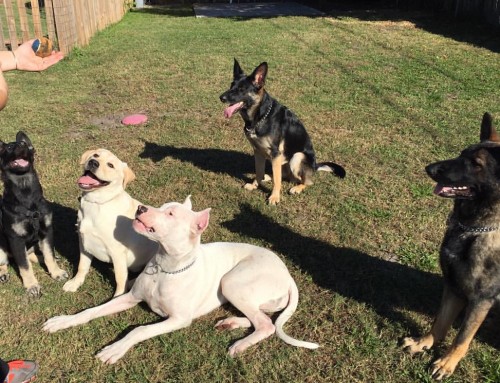Service animals play an incredibly important role in our community. They offer assistance and companionship to people with disabilities. For many people with disabilities, the assistance of a service animal is an essential part of their daily life.
What is a service animal?
The Americans with Disabilities Act (ADA) of 2010 defines service animals as “any dog that is individually trained to do work or perform tasks for the benefit of an individual with a disability, including a physical, sensory, psychiatric, intellectual, or other mental disability.”
Service animals are specifically defined as “working animals,” not pets. They must perform tasks directly related to a person’s disability.
Dogs who solely provide emotional support or comfort are not regarded as service dogs under the ADA, because they are not trained to do specific tasks. However, emotional support and comfort animals do qualify as “assistance animals” under the Fair Housing Act, which protects people against discrimination when buying or renting a dwelling.
Therapy dogs are also not considered service dogs. Even though therapy dogs require obedience training to visit individuals at hospitals, nursing homes, schools, rehabilitation centers, and other places in our community, they are not trained in specific tasks that are related to an individual’s disability and are not legally considered service animals.
Service animals in Florida law are defined slightly differently. According to Florida Statute 413.08, a service animal can either be a dog or miniature horse. The statute also adds that the “crime-deterrent effect of an animal’s presence” cannot qualify them as a service animal. Other than these minor differences, Florida law defines service animals the same as federal law.
Different types of service dogs
At The 1 Dog Trainer Academy, we have the privilege to train certified services dogs in a variety of skills based on every owner’s individual needs. Tasks that trained service dogs can perform include (but are not limited to):
- Guiding people who are blind or visually impaired
- Alerting people who are deaf or hard of hearing
- Pulling a wheelchair
- Assisting with mobility, balance and physical support
- Retrieving objects
- Opening doors
- Alerting a person to the onset of a seizure
- Alerting a person with diabetes of low or high blood sugar
- Reminding a person to take their prescribed medication
- Calming a person during an anxiety attack
- Calming a person with autism
- Protecting a person during a seizure
Because every service dog handler requires different forms of assistance based on their disability, service dogs can be trained to do many different tasks. Some dogs are more suitable for some types of tasks than other dogs. All service dogs require strong psychological and physical traits in order to reliably perform the work they’ve been chosen to do.
Frequently asked questions (FAQ) about service dogs
Where are service dogs allowed?
Under the ADA of 2010, service dogs are allowed in all facilities where the public is normally allowed to go. This applies to state and local government entities (such as public schools), private businesses, and nonprofit organizations.
Business owners in Florida face a second degree misdemeanor for preventing a person with a disability from bringing a service dog into their facilities.
Where are service dogs not allowed?
Service dogs may only be denied access to a place if their dog is out of control or not housebroken.
My landlord doesn’t allow dogs. Can I still have a service animal?
Yes, the Fair Housing Act states that you cannot be discriminated against for having a service animal. All housing (except rentals with four units or less, single family homes, or housing owned by private clubs or religious organizations) is required to allow service animals.
People with disabilities have the right to request an investigation by the government if they believe they are being discriminated against because of their service animal.
Do I need proof that my dog is a service animal?
No. Staff may only ask if your dog is a service animal and what work the service animal has been trained to do. They cannot require you to provide any kind of identification, documentation or demonstration of the service dog’s training. They also cannot ask you specifics about your disability.
But this doesn’t mean that anyone can say their dog is a service dog. In the state of Florida, falsely claiming that a dog is a service animal is a second degree misdemeanor.
What makes a service dog certified?
There is no government agency that registers service dogs or provides identification, so registration is not required to have a service animal. However, a service dog can receive a certification from a private organization to prove that it was professionally trained using the standards of that organization.
For example, Sharon Burch, owner and professional dog trainer at The 1 Dog Trainer Academy in Central Florida, is a PSD Academy Certified Service Dog Trainer. This means that graduates of the Service Animal Academy will be registered with The 1 Dog Trainer Academy after successfully completing the required hours and training of the Service Animal Academy and passing their public access testing.
Knowing that a service dog is well-qualified gives peace of mind to service animal handlers and owners who will be confident in their dog’s professional training when it’s needed.
How can I get my service dog certified?
Certification by reputable organizations is normally only available to dogs that have been trained by registered professional trainers from day one. This is the only way to ensure that the dog meets all the requirements for service dog certification. For example, at The 1 Dog Trainer Academy, only dogs that are pre-approved or begin training at the age of 2 months can attend service animal training to become professionally certified service dogs.





